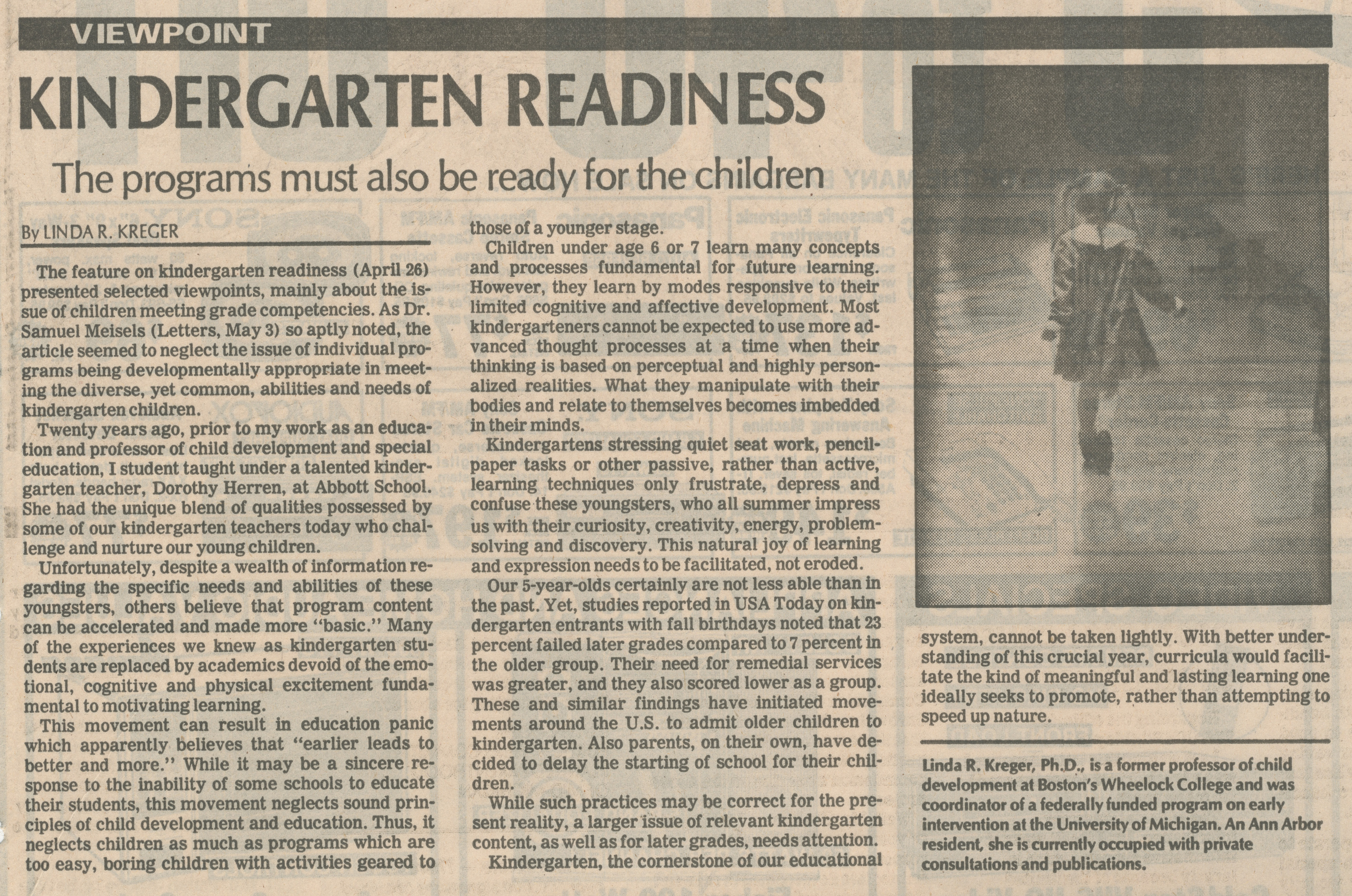Kindergarten Readiness

The programs must also be ready for the children
The feature on kindergarten readiness (April 26) and Prnnssses. fundamental for fntllre learnin8~ “iii y
presented selected viewpoints. mainly about the is- However. they learn by modes responsive to their an ,._¢lL if
< sne of ehildren meeting grade eempeteneies- As Dr- linnlted eeenitive and affeetlve develenment- Mast T
Samuel Melsels (Letters, May 3) so aptly noted. the f kindergaiteners ¢ann°t be eirneeted te use more ad-
erttete seemed to neglect the issue of infuvidnel pre sensed thought processes at s time “ne” the"
= grams being- developmentally appropriate in meet- thinking is based ~0n Perneptllnl and highly person-
ine the diverse. yet common, abilities and needs of alized realities- What they manipulate with their
i kindergarten children- ‘ t f nndlss and relate to themselves becomes imbedded
Twenty years ago. prior to mywork as an ednca- 1 v in their minds- T
tion and professor of child development and special ‘““°°”ga”°”Si stressing quiet seat Work' pencil'
education, I student taught under a talented kinder- paper tasks or other passive, rather than active.
garten teacher. Dorothy Herren. at Abbott School- learning teehnidhes only irnstrate» depress and
She/had the unique blend of qualities possessed by °°nfllse'these youngsters. Who all Summer impress
ff some of our kindergarten teachers today who chal- us with their curiosity, creativity, energy, problem-
_ lenge and nurture our young children. solving and discovery. This natural joy of learning
Unfdrtllnatellh desliiteawealth df information rs' and eaprehsion needs tobefaeilitated net eroded
‘ . garding the specific needs and abilities of these our 5-yeerplds certainly are not less able than in n
ygungsters, gthers believe that prggrarn gontgnt the past. Yet, studies reported in USA Today on kin. » ’.§%§¥§E§ =_- ,giiii §§i§5§%§§i§?§§§;§;§;§21§=fi?1§f§'E=2i%1§§2s§;§§§§§23252§2§§§€¥=?éiééEi?5€f€§%§?52i?§2§?§¥2E2E3223?22222Fi;2232222§s§§§§?§§=§12i€¢€=E==%i’i2§‘*=%s:5’12'
can be accelerated and made more “basic.” Many dergarten entrants with fall birthdays noted that 23
of the experiences we knew as kindergarten stu- ' percent failed later grades compared to 7 percent in system, canllnt be taken lightly- With better Under'
dents are replaced by academics devoid of the emo- the older group. Their need for remedial services standing of this Crllnial Yeah curricula W0llld faCili°
, tional, cognitive and physical excitement funda- was greater, and they alsoiscored lower as a group. tate the kind of rneanlngflll and' lasting learning one
mental to motivating learning. . i , These and similar findings have initiated fnove- ideally seeks to promote, rather than attempting to
This movement can result in education panic ments around the U.S. to admit _older children to' speed UP nature.
which apparently believes _that “earlier leads to kindergarten. Also parents, on their own, have de- _
better and more.” While it may be a sincere re- y cided todelay the starting of school for their chil- unda R_ K,ege,, p|,_D_' is 3 ¢o,me,pmfesso,°¢'¢hi|d
sponse to the inability of some schools to educate ` j dren. _ f _ ` 1 ' ` de,,e|0p,,,e,,¢ at Bastdnfs whedock Conege and was y
s~ their students, this movement neglects sound prin- While such practices may be correct for the pre-it , cmdinato, of a fede,a||y funded pmgnm on early
. ciples of child development and education. Thus, it sent reality, a larger 'issue of relevant kindergarten intewemion at ,he Univenity of Michigan. An Ann Arbo,
neglects children as much as programs which are content, as well as for later grades, needs attention. ,esident ,he is ¢u,,em|y occupied with private ..
. too easy, boring children with activities geared to \ Kindergarten, the cornerstone of our educational m,,,,,|¢a¢;,,,,, and pub|;at;°,,,_ i ,
Article
Subjects
Linda R. Kreger
Education
Editorial
Has Photo
Ann Arbor News
Old News
Dorothy Herren